|
|
|
Sort Order |
|
|
|
Items / Page
|
|
|
|
|
|
|
| Srl | Item |
| 1 |
ID:
135583
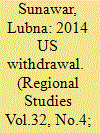

|
|
|
|
|
| Summary/Abstract |
The deployment of international troops in Afghanistan led by the US in 2001 brought new challenges for Pakistan to deal with. With American troops based in Afghanistan’s side of the border, the question of where the border was and Pakistan’s responsibilities for maintaining peace, law and order in its own territories acquired international attention. Militants were allegedly hiding on both sides of the border and were entering Pakistan through this porous border.
|
|
|
|
|
|
|
|
|
|
|
|
|
|
|
|
| 2 |
ID:
146495
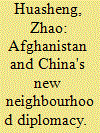

|
|
|
|
|
| Contents |
This article investigates the latest developments and changes in China's increasingly active diplomacy towards Afghanistan. This is interpreted from two perspectives. First, focusing on China's domestic perspective the author points out that under the ‘one belt, one road’ initiative, China's interests in Afghanistan have expanded, particularly in the area of transport; it has started seriously to consider Afghanistan as a transport corridor. The other perspective considers the withdrawal of US military forces and the International Security Assistance Force (ISAF) from Afghanistan in 2014, which has been followed by a critical transitional period. Concerned by these developments, China has increased its involvement and taken on more responsibilities, as demonstrated by the unprecedented frequency of Chinese senior officials’ visits to Afghanistan; the significant increase of bilateral aid to Afghanistan; and above all, the fact that Beijing has begun to coordinate negotiations between the Taliban and the Afghan government. The process of political reconciliation in the country will be extremely difficult and a quick solution is not to be expected. With regard to the idea that the Chinese are filling a ‘vacuum’ left by the US, the article argues that the so-called vacuum does not actually exist because the US military presence was temporary and the withdrawal of the US forces represents a return to the normal state of affairs. Also, excluding the US is not part of Beijing's policy in this area; rather, it is cooperating with the US and other countries in assisting Afghanistan.
|
|
|
|
|
|
|
|
|
|
|
|
|
|
|
|
| 3 |
ID:
149462
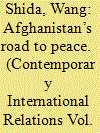

|
|
|
|
|
| Summary/Abstract |
After 15 years of war in Afghanistan since the US sent troops, the peace process seems to have little traction. As the war has worn on, the Afghan government, the United States and allies have failed to end the continuing Taliban insurgency that even as late as the October 2016 favored suicide bombers, road mines and the killing of civilians. When the Afghan government and Afghan Taliban held their first direct talks in 2015 with Pakistan’s mediation, there seemed hope of resolution but the death of Taliban leader Mullah Omarin July 2015 derailed the peace process. In the wake of the drone attack that killed his successor Mullah Akhtar Mansour, the Taliban has violently fought Afghan government troops. The mechanism formed in 2009 of China, the US, Pakistan and Afghanistan is trying to try to putpeace talks back on track and restore stability, but the attack on a shrine full of Shiite worshippers and numerous other Taliban attacks to retake parts of the country are the latest atrocities.
|
|
|
|
|
|
|
|
|
|
|
|
|
|
|
|
| 4 |
ID:
189248
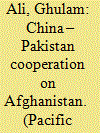

|
|
|
|
|
| Summary/Abstract |
This article studies China’s and Pakistan’s key interests in Afghanistan, and their mutual cooperation to pursue them. It identifies security, energy, connectivity and geopolitics as China’s main interests. Get recognition of the Durand Line as an international border with Afghanistan, prevention of ‘hostile elements’ from using Afghan territory and access to the CARs as those of Pakistan’s motives. Both sides cooperated with each other on Afghanistan under the umbrella of their strategic partnership. Islamabad helped in establishing initial Taliban-China contacts and persuaded the Taliban for negotiations with the USA and Kabul authorities. Beijing supported Islamabad’s Afghan policy and mediated between Islamabad–Kabul and Taliban–Kabul negotiations. China and Pakistan backed their diplomacy with economic assistance and extended CPEC and BRI to Afghanistan. Amidst various challenges, thus far Sino-Pakistan cooperation on Afghanistan has benefited to their mutual interests and contributed to the peace process. Afghanistan has emerged as a new chapter of their relationship. How Sino-Pakistan cooperation advances in this troubled country in future is yet to be seen.
|
|
|
|
|
|
|
|
|
|
|
|
|
|
|
|
| 5 |
ID:
130258
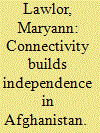

|
|
|
| 6 |
ID:
132445
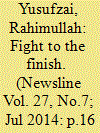

|
|
|
| 7 |
ID:
128373
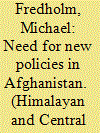

|
|
|
|
|
| Publication |
2011.
|
| Summary/Abstract |
A decade has passed since the defeat of the Taliban government in Afghanistan, and it is hardly surprising that several member-states of the International Security Assistance Force (ISAF) wish to pull out their military forces from Afghanistan, or have already decided to do so. Yet, at first glance not even one of Afghanistaifs multiple problems appears to have been resolved. The Taliban insurgents remain a viable force, and violence regularly occurs throughout the country. The casual observer may well wonder whether the security assistance provided by the international coalition has been of any use at all. Indeed, the ISAF members in many ways appear to have followed contradictory and self-defeating policies in their valiant attempt to remake war-tom Afghanistan into a Western democracy overnight. While not all their efforts have been in vain, more could have been achieved if the realities of Afghanistan had been better understood by those who formulated ISAF policy. The reason for this failure in understanding the Afghan human landscape would seem to depend on two factors: first, an emphasis on do-good policies that included the immediate
introduction of democracy under a strong, central government - which appealed to Western voters but had already been proven futile or outright misguided in almost a century of Afghan attempts at state and nation-
building; second, the lack of a properly focused intelligence effort in Afghanistan, with sufficient resources and the goal to monitor conditions in the country instead of a single-minded focus on targeting in support
of actions against individual terrorists ("the War on Terror"). Or, put in different terms: while Westem military might initially was successfully brought to bear on the Taliban movement, the brain of the military was.
|
|
|
|
|
|
|
|
|
|
|
|
|
|
|
|
| 8 |
ID:
122865
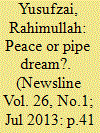

|
|
|
| 9 |
ID:
131067
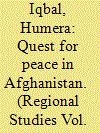

|
|
|
| 10 |
ID:
123442
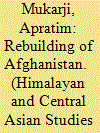

|
|
|
|
|
| Publication |
2011.
|
| Summary/Abstract |
Ten year on since its deliverance from the vicious clutch of the obscurantist Taliban, Afghainstan today is bestest by problems created and coumpounded by a largely unsuccessful US-led military campaign. The civilian population is largely alienated by wanton deaths of innocents is misdirected NATO ground assaults, aerial bombardments, and drone attacks. Also saddled with a decade-old regime largely confined to urban centres, President Hamid Harzai is demoralized not only by his failure to build a domestic support base but also by his complete disenchantment with the United States and other Western allies, which has led to his subsequent and desparate search for allies among the Taliban themselves. Meanwhile, both Pakistan on the eastern front and Iran on the Western front brazenly continue to play their own games by promoting proxies within the indigenous fundamentalist forces. Besides, drug trafficking and corruption, among a host of other problems, continue to defy solutions. By no means, a beguiling picture that the South Asian country today presents to the world.
|
|
|
|
|
|
|
|
|
|
|
|
|
|
|
|
| 11 |
ID:
093887
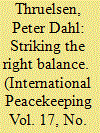

|
|
|
|
|
| Publication |
2010.
|
| Summary/Abstract |
A well-trained, professional police force dedicated to upholding the rule of law and trusted by the population is essential to fighting the insurgency in Afghanistan and creating stability. However, the police programmes in Afghanistan have often been dominated by different national agendas and hampered by too few resources and lack of strategic guidance. These issues pose an enormous challenge for the Afghan government and the international community in rebuilding the police. This article argues that it is imperative that the international effort strike a balance between the short-term needs of fighting an insurgency and the long-term needs of establishing an effective sustainable policing capability when building up the police force - and that the process must not be subject merely to satisfying current security challenges or traditional state-building needs.
|
|
|
|
|
|
|
|
|
|
|
|
|
|
|
|
| 12 |
ID:
123982
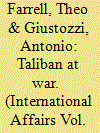

|
|
|
|
|
| Publication |
2013.
|
| Summary/Abstract |
In seeking to explain why and how the war in Afghanistan has dragged on, most analysis has focused on the western and Afghan government effort. This article examines how the war looks from the perspective of the insurgency. Using Helmand province as a case-study, the authors draw on a large number of original interviews with Taliban field commanders and fighters to produce a uniquely detailed picture of the Taliban at war.
In the first section, the article explores how the Taliban returned to Helmand from 2004 to 2006, and show how the British made the situation far worse when they deployed forces to Helmand in 2006. In the second part of the article the authors examine the evolution of the Taliban insurgency in Helmand since 2006. They show how the Taliban has developed an increasingly centralized organizational structure, a more militarized shadow government and greater professionalism of field units.
The overall picture that emerges is of a resilient insurgency that has adapted under immense military pressure. The Taliban have suffered very heavy attrition in Helmand, but they are far from defeated.
|
|
|
|
|
|
|
|
|
|
|
|
|
|
|
|
| 13 |
ID:
118651
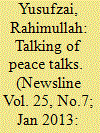

|
|
|
| 14 |
ID:
139343
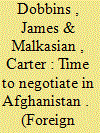

|
|
|
|
|
| Summary/Abstract |
Peace talks, if not peace itself, may be close at hand in Afghanistan. Over the past few months, Afghanistan, Pakistan, and the Afghan Taliban have made unexpected strides toward talks. In early May, members of the Taliban and the Afghan government even met in Qatar and expressed real interest in starting official negotiations—a heartening step.
|
|
|
|
|
|
|
|
|
|
|
|
|
|
|
|
| 15 |
ID:
131622
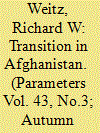

|
|
|
|
|
|
|
|